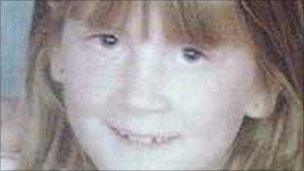Hyponatraemia inquiry into the deaths of five NI children resumes
- Published

Nine-year-old Raychel Ferguson died in hospital in 2001
The senior counsel for the public inquiry into the deaths of five children in NI hospitals has described aspects of Raychel Ferguson's care at a Londonderry hospital as "confused and uncertain".
The nine-year-old from Derry died in the Royal Belfast Hospital for Sick Children in 2001.
It followed surgery at Derry's Altnagelvin Hospital.
The inquiry was set up eight years ago.
Hyponatraemia, which can be fatal, is the term for a low level of sodium in the blood stream causing the brain cells to swell with too much water.
The inquiry is examining the deaths of Adam Strain, aged four, Raychel Ferguson and Claire Roberts, nine, and it is also investigating the events following the deaths of Lucy Crawford, aged 17 months, and specific issues around the treatment of 15-year-old Conor Mitchell.
So far the inquiry has examined evidence surrounding the deaths of Adam Strain and Claire Roberts.
Now legal teams have moved on to the death of Raychel Ferguson who was a Primary 5 pupil at St Patrick's Primary School in Derry.
One of four children, Raychel was the family's only daughter.
The court heard of a hospital process "with no clear structure and no acceptance of responsibility between members of staff".
It has heard how on 7 June, after returning home from school, Raychel ate dinner but then complained of tummy pains.
When her condition deteriorated her mother brought her to Altnagelvin Hospital's accident and emergency department.
After an operation to remove her appendix, the child became seriously ill and was transferred to the Royal Victoria Hospital where she died.
Expert witnesses have questioned whether surgeons acted too quickly and why her parents were not properly informed that the operation was taking place.
There was severe criticism about the lack of record-keeping.
As with the cases of the other children, the inquiry is paying special attention to the management of Raychel's fluid balance.
In particular, whether she should have received the particular type of fluid and at the rate it was administered.
Established in 2004 by the then minister for health Angela Smith, the public inquiry was suspended in 2005 to allow the police to investigate.
In 2008, the police closed their investigations and the Public Prosecution Service directed that no prosecutions be brought.
- Published31 October 2012
- Published15 October 2012
- Published25 September 2012
- Published24 September 2012
- Published24 September 2012
- Published16 April 2012
- Published27 March 2012
- Published26 March 2012
- Published26 March 2012
- Published29 February 2012
- Published20 February 2012